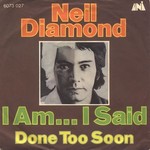I Am...I Said
| "I Am... I Said" | ||||
|---|---|---|---|---|
 |
||||
| Single by Neil Diamond | ||||
| B-side | "Done Too Soon" | |||
| Released | March 15, 1971 | |||
| Format | 7" 45 RPM | |||
| Genre | Pop rock | |||
| Length | 3:32 | |||
| Label | Uni | |||
| Writer(s) | Neil Diamond | |||
| Neil Diamond singles chronology | ||||
|
||||
"I Am... I Said" is a song written and recorded by Neil Diamond. Released as a single on March 15, 1971, it was quite successful, at first slowly climbing the charts, then more quickly rising to number 4 on the U.S. pop singles chart by May 1971. It fared similarly across the Atlantic, reaching number 4 on the UK pop singles chart as well.
"I Am... I Said" took Diamond four months to compose. One of his most intensely personal efforts, it depicts the singer lost between two worlds:
Verses start quietly in a low vocal range, half sung and half spoken, with a soft rock guitar and light strings backing. By the chorus climaxes, the vocals are much louder and higher in pitch, with horns, heavier drums and more strings joining in, but the singer even more uncertain:
Neil Diamond told Mojo magazine July 2008 that this song came from a time he spent in therapy in Los Angeles. He said:
In the same month, he told Q that the song was written "to find [him]self" and added,
But Diamond has also given another inspiration for this song: an unsuccessful tryout for a movie about the life and death of the comedian Lenny Bruce. Author David Wild interviewed Diamond for a 2008 book and he discussed how his efforts to channel Lenny Bruce evoked such intense emotions that it led him to spend some time in therapy.
"I Am... I Said" was later included on Diamond's November 1971 album Stones. The single version leads off the LP, while a reprise of the song, taken from midway to a variant ending with Diamond exclaiming "I am!", concludes.
Critical opinion on "I Am... I Said" has generally been good, with Rolling Stone calling its lyric excellent in a 1972 review, while The New Yorker used it to exemplify Diamond's songwriting opaqueness in a 2006 retrospective. A 2008 Diamond profile in The Daily Telegraph simply referred to the song's "raging existential angst," and Allmusic calls it "an impassioned statement of emotional turmoil... very much in tune with the confessional singer/songwriter movement of the time."
...
Wikipedia
